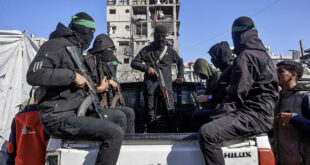 NABLUS (Reuters) — Israeli forces seized a Palestinian Cabinet minister and more than 30 other officials on Thursday in a new phase of a crackdown on Hamas that a United Nations envoy described as “troublingâ€.The group vowed to use “any means†to free those detained. It also defied more Israeli air strikes in Gaza and a truce call from Palestinian President Mahmoud Abbas by again firing rockets into Israel. Hamas derided Abbas, who leads the rival secular Fateh faction, as out of touch with the mood of his people.
NABLUS (Reuters) — Israeli forces seized a Palestinian Cabinet minister and more than 30 other officials on Thursday in a new phase of a crackdown on Hamas that a United Nations envoy described as “troublingâ€.The group vowed to use “any means†to free those detained. It also defied more Israeli air strikes in Gaza and a truce call from Palestinian President Mahmoud Abbas by again firing rockets into Israel. Hamas derided Abbas, who leads the rival secular Fateh faction, as out of touch with the mood of his people.
Overnight, Israeli troops entered Nablus, in the occupied West Bank, and took into custody Palestinian Education Minister Naser Al Shaer of Hamas. They also seized at least three Hamas members of parliament, the mayor and deputy mayor of Nablus and other Hamas officials in neighbouring towns and villages.
The Israeli army said 33 people were held across the West Bank. Last year, after Hamas won parliamentary elections, Israel seized more than 30 Hamas lawmakers, who are still being held.
Hamas said in a statement: “The continued detention of lawmakers and ministers gives Hamas the right to use any means to free them…. Harming them will open the gates of hell.â€
Prime Minister Ismail Haniyeh of Hamas took Fateh members into his Cabinet in March, forming a unity government in a bid to ease tensions and end year-old international sanctions. But fighting between the factions in Gaza last week and days of hostilities between Hamas and Israel have shredded such hopes.
Palestinian government spokesman Ghazi Hamad said the arrests displayed “a scale of escalation and Israeli arroganceâ€. Information Minister Mustafa Barghouthi called the arrests an attack on all the Palestinians’ elected institutions.
The Israeli army said in a statement: “The Hamas terror organisation is currently involved in enhancing the terror infrastructure in the [West Bank] region, based on the model used in the Gaza Strip. The organisation exploits governmental institutions to encourage and support terrorist activity.â€
The new UN special envoy to the Middle East voiced concern: “I’m troubled when I see Israeli soldiers arresting Palestinian legislators. I’m troubled that the education minister was arrested,†Michael Williams told Reuters.
He said it was of particular concern that few of those held since last year had been charged.
As violence continued in Gaza, including Israeli air strikes, Hamas rocket fire and friction between Palestinian factions, Williams said an international peacekeeping force was a viable possibility that he would discuss with all parties.
Abbas said after meeting European Union foreign policy chief, Javier Solana, in Gaza that firing rockets into Israel “must be stopped†and that he hoped for a broader ceasefire.
That drew an immediate verbal and physical response from Hamas, which said it fired another rocket into Israel. Within the hour, Israeli aircraft conducted two more strikes in Gaza, hitting positions used by Hamas fighters. Several people were wounded in the first. Casualties in the second were not clear.
Sami Abu Zuhri of Hamas said: “Rockets will be fired as long as the Zionist aggression against our people continues.†He said Abbas’ call for a halt to rockets showed that he did not back “resistance†and it “contradicted the Palestinians’ consensusâ€.
The Islamist group and others said they would consider stopping the rocket firing only if Israel first called off all of its military operations in Gaza and the West Bank. Israel has rebuffed similar demands in the past, arguing its West Bank operations are essential to preventing militant attacks.
Some 50 Palestinians have died in this month’s fighting between Hamas and Fateh. Air strikes have killed at least 35 Palestinians, at least 23 of them fighters. More than 150 rockets, one of which killed an Israeli, have been fired from Gaza.
 Eurasia Press & News
Eurasia Press & News



